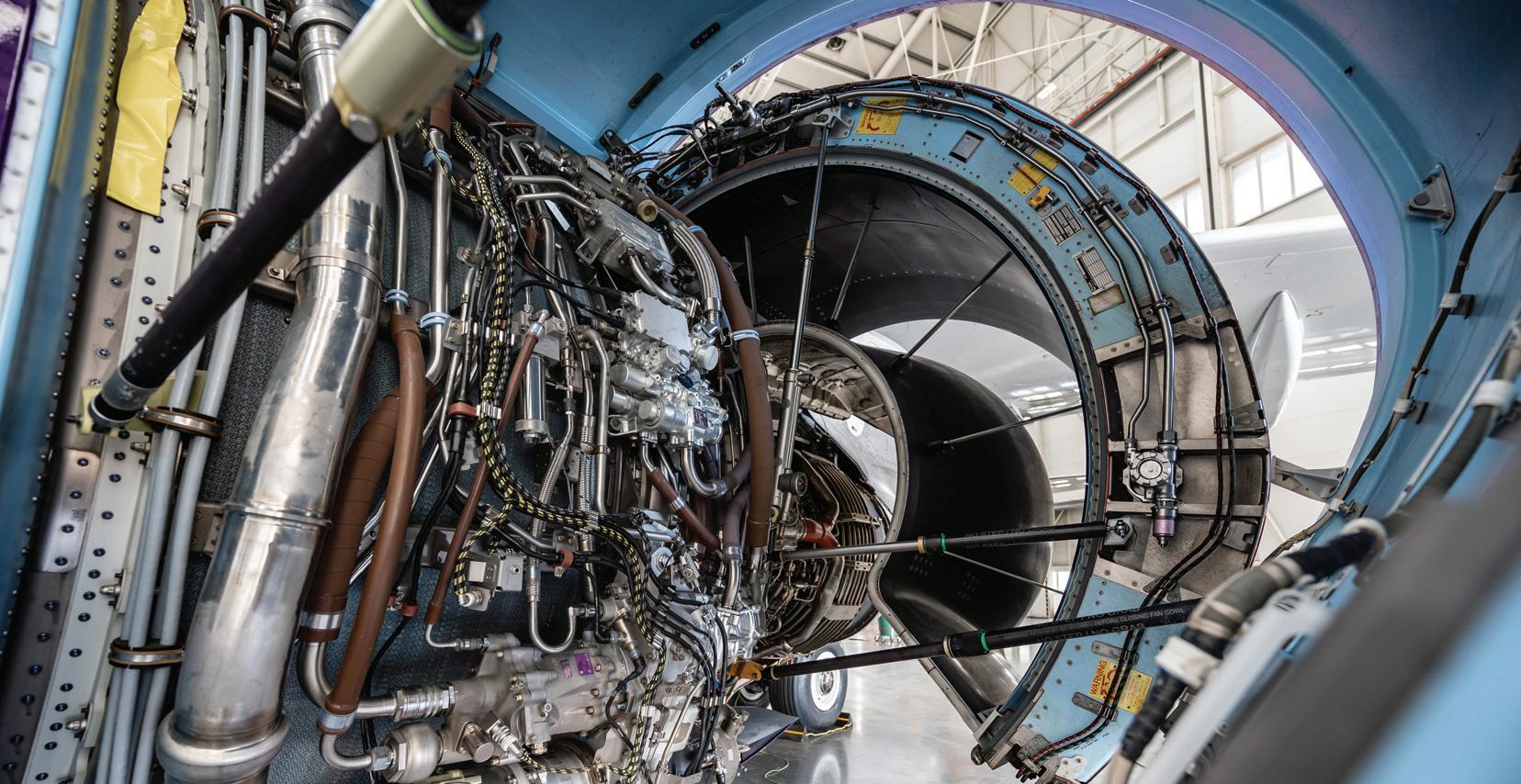



JOB AIR Technic was founded in 1993 as a base maintenance centre for aircraft, and is today a successful EASA/FAA approved organisation. In 2008 JOB AIR Technic built a new facility, which is considered one of the biggest single-span maintenance hangars in Central Europe. CEO Vladimír Stulančák gave details to Hannah Barnett about how (and why) the company has grown.
Th ere is no denying that it has been a turbulent few years in the aviation industry. Operations at JOB AIR Technic were impacted by the Covid pandemic and the subsequent sudden grounding of planes, followed by sanctions on Russian Aircraft after the invasion of Ukraine.
But according to CEO Vladimír Stulančák, one of the fundamental reasons the company continues to be successful is the strong management systems that support its employees.
“l like working with people,” he said. “Each of my employees is different and we will never satisfy everyone at once, but my strategy as CEO is to ensure that all employees who come to my office do not leave without an answer. It might be positive, negative, neutral, it doesn’t matter. What matters is that they do not leave the office without the answer. Because if you are without an answer, you are lost in the system. And if you are lost, then you are not performing.”
A business overview

JOB AIR Technic is certainly doing well, fulfilling 120 orders in 2022 and reporting a 36 million EUR turnover for the year, up from 33 million in 2021. The company now operates two hangars: one of 146 metres, capable of handling six aircraft at one t ime, and another, which opened in 2020, is 94 metres long and has the capacity to hold two Airbus A320 or Boeing 737s at the same time.
The Czech company currently focuses on base maintenance, with includes services like structural work and cabin reconfigurations, as opposed to line maintenance which covers pre-flight checks and scheduled minor repairs.
“There is so much work for base maintenance companies like us at the moment that we don’t know how we would manage if that still included the Russian market too,” Mr Stulančák said. “There are up to 1,000 planes still in Russia, so I can’t even imagine what the market would do if they required maintenance in the EU
market. We are completely full with our workload and happy about it. Of course, summer season is quieter than winter, but still the workload is better compared to the pre-Covid standard seasonality.”
Mr Stulančák also conceded that stabilisation is more important than growth in the industry since the pandemic, largely because of a lack of trained employees: “I think labour shortage is the major issue in the market at the moment. We are lacking several thousands of technicians in Europe.”
Nonetheless, expansion remains on the cards: JOB AIR Technic is a member of the CSG Czechoslovakia group, and the company has an approved growth
strategy for the next five years as part of that. For example, JOB AIR Technic wants to expand into the aircraft painting sector and into line maintenance services to complement its work in base maintenance.

“We are not just going in one direction,” Mr Stulančák said. “For us, complexity is vital. Because if we keep doing what we are doing with base maintenance, to be honest, it would be very difficult to survive. You cannot really be profitable with just one service anymore.”
Strong partnerships
As well as its successful MRO services, JOB AIR Technic has a branch called CAMO, a consultancy and airworthiness management company, ready to serve a wide range of clients including leasing companies, airlines, business aircraft owners, banks and aviation brokers.
CAMO works to protect client interests, whether that means maintaining contractual terms, preserving the value of their assets, or ensuring that all lease terms fully comply with contractual obligations. “With CAMO, we are not just performing maintenance, we can plan it too,” explained Mr Stulančák. “So we are at the beginning of the supply chain for clients.”
A recent partnership with Sunaero is intended to strengthen the company s position in the Central European market by offering customers innovative solutions for fuel tank repairs. Sunaero carries out specialist work as a leading provider of helium preventive leak checks and fast leak repair for A/C fuel tanks.

“The service Sunaero offers is very spe cific,” Mr Stulančák added. “So we are working with them, and others, for services that are either too expensive or time consuming for us – so we contract them externally. We want to be able to
offer our customers complexity, maybe for a job it is not possible to do in one hangar.”
Another profitable partnership comes in the form of ABC International, ‘The Cabin Branding Specialist.’ The successful Italian company creates customised interior aircraft designs and JOB AIR Technic is one of its approved partners. “We work closely with them,” said Mr Stulančák. “Often, the customer orders this service in advance, before they come to us; we really have to preserve a strong relationship with ABC International, so that they recommend us. We think it is working quite well.”
JOB AIR Technic has also signed a contract with AJ Walter, the worldleading independent component parts, repair and supply chain solutions provider. “We have a very good relationship with them. They are the component provider for all our customers,” said Mr Stulančák.
Sustainable management
In 2020, JOB AIR Technic was awarded ISO 14001 certification. The internationally agreed standard sets out the requirements for an environmental management system, and helps organisations improve their environmental performance through more efficient use of resources and reduction of waste.

“I think sustainability is one of our biggest challenges,” reflected Mr Stulančák. “But we try and keep our systems and processes in check. Last year, we performed 200 audits, both internal and external. That’s a lot, and although I am not saying audits automati -
cally create sustainability, they are part of it, especially for ISO 14001.”
JOB AIR Technic has a lean maintenance system in place, which relies on self-directed teams, and routine tasks being scheduled as efficiently as possible. According to Mr Stulančák, the company also utilises the five principles of noted business philosophy, Kaizen and adopting these strategic systems seems to be paying off.
“It is working well,” he said. “We have an open-door policy. Employees have absolute freedom to report everything. The number of reports from last year has increased by more than 200 per cent. So people are really acting differently.
They are not just reactive, but proactive. They want to improve.”
Mr Stulančák must be doing something right, because JOB AIR Technic has doubled in size and turnover since he took over as CEO four years ago. “When I joined, I changed the management team and we set out a clear vision,” he concluded.



“I took my experience from working in the Lufthansa group and found that if you have c lear targets, you just need to do systematic work. And I think this, along with the courage to be creative, is crucial in business.
“I always tell my employees to remember two things in their work: positivity and courage.”


